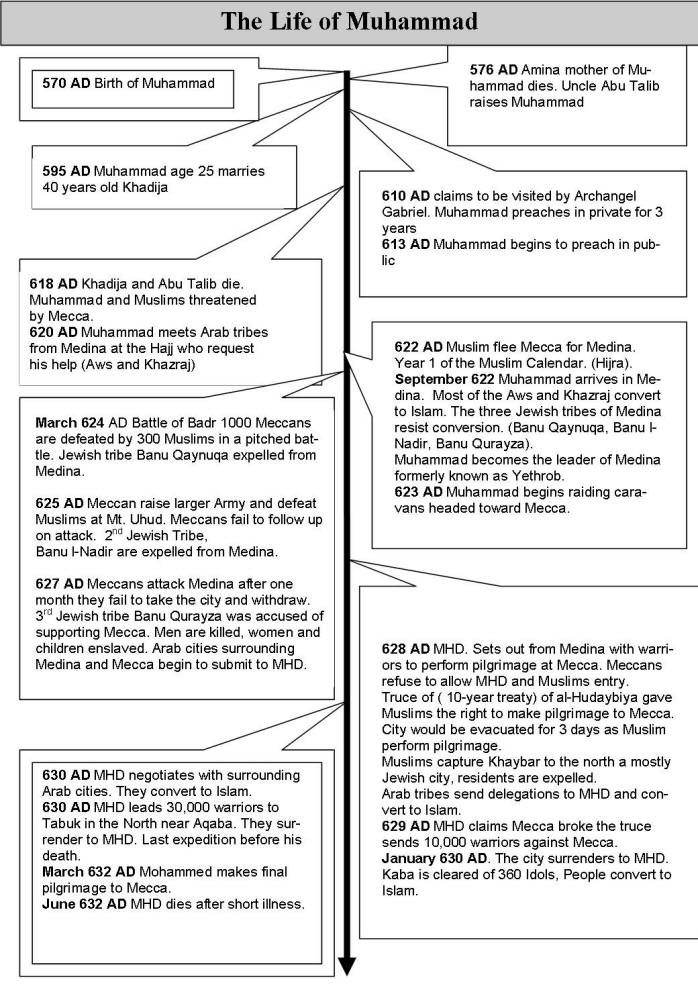|
The History of Islam:
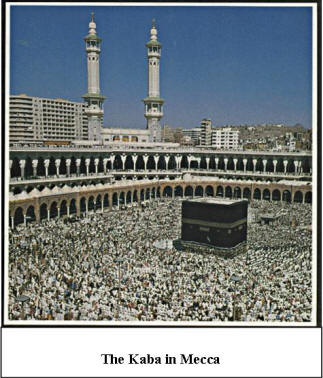 Pre-Islamic Pre-Islamic
The Arabian Peninsula the birthplace of Islam is one of
the hottest and driest regions in the world, consisting
mainly of deserts. Since ancient times, tribes of the
nomadic race had populated the region. Considered the
descendents of Noah’s third son Shem, they are called
Semites. Over the centuries, theses Semitic people have
migrated into the Fertile Crescent, assimilating into
existing civilizations.
In the sixth century AD, north of the Arabian Peninsula
two great powers, locked in a seesaw power struggle vied
for control of the Middle East. The Christian Byzantine
kingdom, successors of the Roman Empire was to the
Northwest and controlled the Mediterranean Sea, North
Africa and the lands of Palestine. In the northeast lay
the Zoroastrian Persian kingdom. Both the Byzantine and
Persian kingdoms had client Arab tribes allied to their
cause of trade and conquest.
The Arabian Peninsula became a land of refuge for those
seeking escape from both of these empires. Heretic
Christian sects like the Nestorians, and Jewish tribes
escaping the oppressive Byzantines found refuge in the
protective deserts and cities of the Peninsula.
Arabia divided into tribes and cities, each city had
their own favorite god(s) and goddesses. Once a year the
tribes and cities of Arabia would meet in the city of
Mecca during an event known as the Hajj. In Mecca, the
Kaba (Cube), a large cube shaped building housed 360
idols from all the tribes of Arabia. The Kaba was the
center of Arabian religious life. Here all the warring
tribes would put aside their differences as they circled
the Kaba.
From the Kaba they would proceed to the other shrines
outside of Mecca during this five-day religious event.
The Hajj was a tradition that Arabs of the peninsula
remembered going back hundreds of years.
Mohammed
It was in this world Mohammad Ibn Abdallah was born in
the year 570 AD, in the city of Mecca. His father died
before he was born and his mother Amina died when he was
6 years old. Al-Muttalib his grandfather took charge of
the youth and died 2 years later. Abu Talib his uncle
adopted young Mohammed into his family and raised him as
his own son. At the age of 12, young Mohammed was taken
on a caravan-trading venture to Syria and experienced
the world outside of Arabia for the first time. Here
Islamic tradition informs us that a Christian monk named
Buhaira, proclaimed Talib’s young nephew is the last
prophet and warns him about the Jews. For the next
13-years little is known of his life except that he was
involved in caravan trading in and out of Arabia.
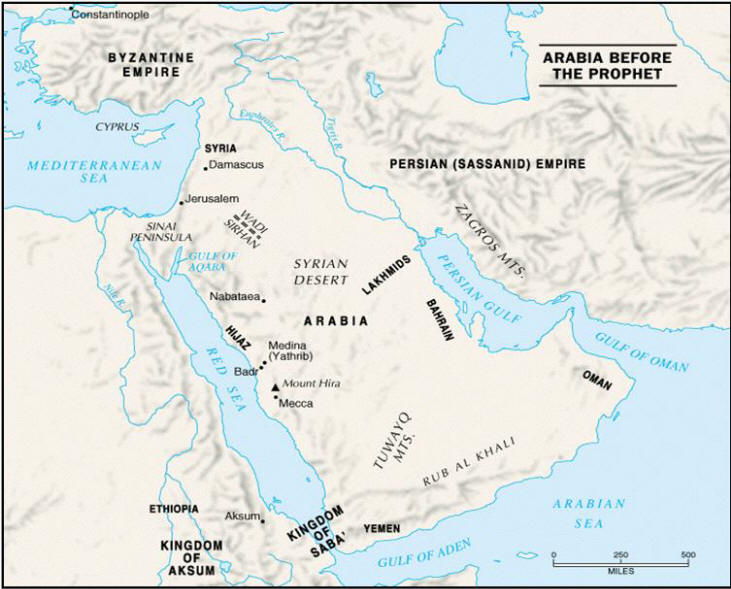 At
the age of 25, Mohammed married a 40-year old wealthy
widow named Khadijah who owned trading caravans. During
the next 15 years of his life, Mohammed interacted with
Arabs known as the Hanefites. Hanefites were Arabs who
rejected idol worship and were searching for the true
religion. They looked to the religion of the Jews and
Christians as being closer to the goal of truth, their
mission was to search for truth. The Hanefites
abandoned their idols, retreated to the caves of Mecca
in meditation and prayer. At
the age of 25, Mohammed married a 40-year old wealthy
widow named Khadijah who owned trading caravans. During
the next 15 years of his life, Mohammed interacted with
Arabs known as the Hanefites. Hanefites were Arabs who
rejected idol worship and were searching for the true
religion. They looked to the religion of the Jews and
Christians as being closer to the goal of truth, their
mission was to search for truth. The Hanefites
abandoned their idols, retreated to the caves of Mecca
in meditation and prayer.
At age 40, Mohammed had his first vision in the year
A.D. 610. He was in a cave on Mt. Hera and thought he
was demon possessed. He went to Khadijah and told her
about the event. She consulted with her uncle Waraca, a
Hanefite who converted to Christianity, who assured them
Mohammed’s vision was from God. Waraca declared Mohammed
was a prophet to the Arab peoples, like Moses to the
Jews, Waraca died 2 years later never becoming a Muslim.
Mohammed proclaimed Allah as the one true god and
rejected the idol worship of Mecca. Khadijah, his wife,
was Mohammed first convert to Islam. Few listened to
Mohammed’s message and animosity grew against him as he
confronted the idol worshippers and preached his
religion to Mecca. Abu Talib his uncle and his tribe the
Hasims protected him during this early Meccan period. In
619, his wife Khadijah and uncle Abu Talib died. Abu
Talib headed the Hasim clan, which Mohammed was a
member. The new leader of the Hasim tribe, his uncle Abu
Lahab refused to protect his nephew Mohammed. During the
next 3-years Mohammed would fear for his life. He sought
refuge and protection in nearby cities from those
seeking his life,.
Then in 621 during the Hajj, Arab tribes from the city
of Yatrob later called Medina, came for the annual
pilgrimage, the Hajj. Meeting Mohammed, they thought him
to be a prophet and invited him to their city to bring
peace and settle disputes between the warring tribes.
Since Yathrob, was a city founded by three Jewish
tribes, the idea of monotheism was familiar concept to
its Arab tribesmen. The Arabs and Jews of Medina were
engaged in both dialogue and trade, including dialogue
about the nature of God and the prophets. The Jewish
tribesmen informed the Arabs about the coming Messiah,
who would one day conquer the world including the Arabs.
The Arab tribes hoped to find this prophet before the
Jews, meeting Mohammed they thought he was the one the
Jews were looking for.
The
Hejira (Flight)
The next year the situation became intolerable for the
Muslims and in June 622 they made what has become known
as the Hejira or flight. In small groups, the 150
Muslims of Mecca left for the city of Medina 280 miles
to the north. When word reached those of Mecca about the
escape to Medina, they tried to kill Mohammed. Mohammed
and Abu Bakr were able to sneak out of the city and
escape to Medina by another route in September 622.
In Medina, the warring Arab tribes submitted to
Mohammed’s leadership and prophet-hood. The Jewish
tribes rejected his claims of prophet and ridiculed his
revelations. With most of the new arrivals from Mecca
without work, they needed to earn a living. Ghazu or
caravan raiding was a way tribes prevented one tribe
from becoming too powerful. The Muslims in Medina began
to rob the caravans heading toward Mecca, this began the
Muslim doctrine of Jihad, as Mohammed waged war on Mecca
from his base in Medina.
With their caravan business threatened, Mecca responds
with one thousand solders at the battle of Bedr in March
624 the Muslims fielded 300 warriors. The battle went to
the Muslims. Mohammed proclaimed his victory was a sign
from Allah and his status in Medina was enhanced. The
lack of enthusiasm by one of the Jewish tribes caused
them to be expelled by the victorious Muslim army. The
direction of prayer was also changed from Jerusalem to
Mecca as the Jews rejected Mohammad’s prophet-hood.
Exactly one-year latter Mecca amassed 3000 solders at
the battle of Uhud and the Muslims fielded 1000 solders.
The battle did not go as planned. The Muslims defeated
by Mecca retreated to Medina. Disheartened, Muslims
blamed the second Jewish tribe as conspirators against
their cause. Their homes and possessions were
confiscated, and they were expelled from the city in
A.D. 626.
The Meccans in the hope of ending the caravan raids by
the Muslims assembled 10,000 solders to attack the city
of Medina in the year 627. After a two weeks siege, in
the hot sun they failed, being unable to penetrate the
fortress like city of Medina. The Meccans returned to
Mecca without victory over Mohammed. After this
unsuccessful attack, Mohammed and the Muslims attacked
the last remaining Jewish tribe. The tribe surrendered
to the mercy of Mohammed, the men were killed and the
women and children were sold into slavery.
The Muslims then begin to consolidate their power with
the surrounding Arab tribes and cities, as a result of
Mecca not being able to remove the threat of Medina and
Muslims to the north.
Mecca
began to feel the economic impact of its trading losses
and Mohammed’s power grew in the north. Mecca
reluctantly signed the 10-year agreement with Mohammed,
the Hudaybiah peace agreement, in March 628. Muslims
were allowed to return to Mecca and worship at the Kaba
once a year. The people of Mecca would leave their city,
so Muslims could come and worship.
Two years later, in January 630, Mohammed lead 10,000
warriors to Mecca and nullified the treaty of Hudaybiah,
because Muslims were killed. The city seeing the growth
of Mohammed’s power, submitted to Mohammed and his
warriors, accepting him as prophet. Mohammed then went
to the Kaba, he destroyed the 360 idols in the
structure. From Mecca, the “Muslims” waged Jihad on the
surrounding cities forcing them to accept Islam as their
religion and Mohammed as their prophet.
Mohammed made his final Hajj in 632 and died
unexpectedly 3 months later in June. His friend and
father in law Abu Bakr (father of Aisha) succeeded him
as leader of the Muslims.
After Mohammad
Abu Bakr received the title “Caliph” or successor of
Mohammed. Following Mohammed’s death there was a
struggle for Mohammad’s successor, some felt Ali the
husband of Fatima, Mohammed’s daughter deserved the
position. Under Abu Bakr, the father of Aisha, won the
struggle. He was able to consolidate Islam's power in
Arabian peninsula, causing the Arab tribes to submit to
Islam. In A.D. 634, Abu Bakr died and was succeeded by
Umar (Omar) the 2nd Caliphate.
Umar advanced the Muslim armies against Syria and
Palestine. In 637 A D, the armies of Byzantium lost
control of Jerusalem to Islam. Uthman the 3rd
Caliph succeeded Umar, Uthman ordered a complete
revision of the Quran, this would cause a mutiny. He was
killed and his death was considered justified because
the mutineers claimed he ceased to be a Muslim.
Following Uthman’s death, there was another struggle
between rival factions of Islam, about the rightful
successor, to lead Islam.
Ali the 4th Caliph, Mohammad’s son-in-law and
husband of Fatima, succeeded Uthman everybody did not
accept him as rightful Caliphate. War broke out between
the rival groups, his succession was short lived, 2
years later, he was killed, the Shi’a (Party of
Ali) mourned the death of Ali, and his two sons
(Grandsons of Mohammed). Ali is revered as a saint by
the Shi’a who are dominate in Iran and Iraq. The Shi’a
see Ali as the rightful successor to Mohammed, they
reject the three earlier Caliphs. The Sunnis
accept Ali and the first three Caliphates as legitimate
successors to Mohammed.
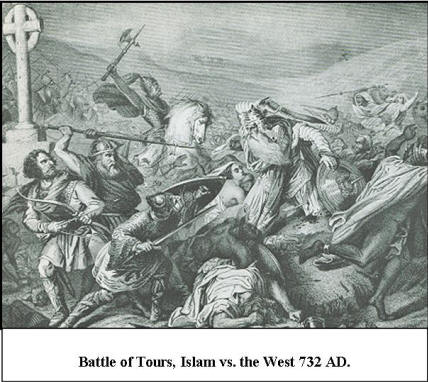 After
the defeating the Byzantines and Persian kingdoms in
successive battles in Palestine and the Middle East, the
armies of Islam continued to advance. The armies of
Islam advanced into North Africa, taking control of the
southern Mediterranean regions. Within 100 years of
Mohammad’s death, the armies of Islam reached the city
of Tours, in France. In Tours the Muslim advance was
stopped. After
the defeating the Byzantines and Persian kingdoms in
successive battles in Palestine and the Middle East, the
armies of Islam continued to advance. The armies of
Islam advanced into North Africa, taking control of the
southern Mediterranean regions. Within 100 years of
Mohammad’s death, the armies of Islam reached the city
of Tours, in France. In Tours the Muslim advance was
stopped.
In the Battle of Tours, Charles Martel the grandfather
of Charlemagne defeated the advancing Muslim armies.
From Tours Muslim power in Europe retreated and in the
1489, Ferdinand and Isabella of Spain defeated the last
remaining forces in Spain. Later, the Ottoman Empire
would retreat from the rest of Europe.
In the East, Islam was also expanding by the 13th
century; Islam had reached the Pacific Ocean. The
Islamic faith now spanned from the Atlantic to the
Pacific. Ferdinand Magellan, in his attempt to bypass
Muslim controlled areas in the Indian Ocean, found the
passageway to Asia via the Atlantic Ocean.
Magellan was in a race, to advance Christianity into
Asia, before Islam. Magellan was successful in
introducing Christianity to the Philippines (Named after
King Philip of Spain) Islam and Christianity met in the
Philippines as the northern Islands were converted to
Christianity and the Southern parts of the Philippines
and Indonesia became muslim. Islam and Christianity
became the two major rival religions in the world.
Islam Today
Islam today is in conflict, between western
secular culture and traditional Islamic culture. The
growth of Islamic Fundamentalism is an attempt to reach
back to the glories of Islamic history. Many
Fundamentalist (Muslim) ask themselves the question, If
Islam is the religion of Allah, why are we being
defeated by the West (United States) and Israel. The
fundamentalist sees the problem with the failure of
Islamic nations to live as the Quran commands. Not
living the life and traditions required by Allah, as
specified in the Quran, is the cause of Islam’s weakness
and defeat by the West, this is the spark of
fundamentalism. Today in Islam, there is a struggle
between moderate and fundamentalist ideology, moderates
strive to be more western and while the fundamentalists
look to the days of the
prophet.
Understanding the books of the Islamic faith
is just as important to understanding its history. The
books of Islam shape both the culture and philosophy of
the Muslim world
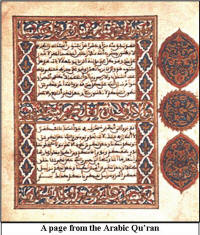 The
Books of Islam The
Books of Islam
History of the Quran:
The
Qur’an:
“Reading” The Quran is the “Word of God” to Islam. About
4/5ths the length of the New Testament, Muslims believe
the identical book is in Heaven and Allah sent the angel
Gabriel to Mohammed to reveal his “Word”. The Quran is
divided into 114 chapters or Surahs. The Surahs are
revelations given to Mohammed during his 23 years of
“Prophethood” from 610 AD to 632 AD.
The Quran, composed during Mohammed’s lifetime
corresponds to the time and circumstances of his life.
The Surahs or chapters can be divided into three
periods.
The earliest Surahs are the shortest and
known as Early Meccan, and date from 610 to 622
AD. Composed in Mecca, prior to Hejira where Mohammed
fled to Medina in September 622 AD.
The Median Surahs were composed during the time
Muslims controlled the city of Medina. They date from
622 to 630 AD. The doctrine of Jihad was introduced as
war was waged against Mecca and its idol worshipers.
Animosity toward the Jews and Christians increased as
they rejected Mohammed as a prophet from God.
Late
Meccan
Surahs were between 630 and 632 AD. The last 2 years of
Mohammed’s life after Mecca surrendered to his
authority.
Surahs were at this time not collected in one book but
were memorized and collected on various items. In the
battle of Yamamah, in 633 AD many of the Hafiz died. The
Hafiz were Muslims who had committed much of the Quran
to memory. With the urging of Umar, Zayd ibn Thabit, one
of Mohammed most trusted secretaries was appointed to
the task of collecting the Quran into one book. Still
later after different versions of the Quran began to
appear, Zayd was put in charge of collecting all the
Qurans throughout the Muslim world and issuing an
authorized copy in the place of ones collected.
The Quran makes the appeal to its beauty and consistency
with previous scriptures as proof of its inspiration.
23
And if ye are in doubt as to what We have revealed from
time to time to Our servant, then produce a Surah like
thereunto; and call your witnesses or helpers (if there
are any) besides Allah, if your (doubts) are true.
24 But if ye cannot
- and of a surety ye cannot - then fear the Fire whose
fuel is Men and Stones - which is prepared for those who
reject Faith. Surah 2:23-24
The
Hadith:
“Tradition” After the death of Mohammed, his followers
collected his sayings and actions in books to guide and
direct their beliefs. They give additional meaning
behind the Surahs and help interpret their meanings. The
most respected Hadith are Bukari, and Muslim.
Muslims do not feel the Hadith is the “Word of God”.
They would compare the Hadith, to the Gospels, which
reports what Jesus said. The Quran is the Word of God
from Heaven via Gabriel.
Who is a Muslim: A Muslim is someone who has submitted
to Allah. One submits to Allah by confession of the
Shahada or the 5 pillars of faith. Besides the five
major beliefs or doctrines in Islam, there are these are
observances in Islam, which are foundational practices
or duties every Muslim must observe.
The
Five Pillars of Faith
1. “The Confession” "La ilaha illa llah" "There
is no God but God." The Shahada, (Testimoney)
Kalima There is no God but Allah, and Muhammad is the
Prophet of Allah.
2. Salat Prayer 5 times a day facing Mecca
3. Zakat Almsgiving
4. Fasting during the month of Ramadan, from
sun-up till sundown.
5. Hajj Pilgrimage to Mecca once a lifetime
The
Beliefs of Islam
The
Five Articles of Faith
1.
God:
There is only one true God and his name is Allah. Allah
is all knowing, all-powerful and sovereign judge. Yet
Allah is not a personal God, for he is so far above man
in every way, he is not personally knowable. The
emphasis of the God of Islam is on judgment and power,
not grace and mercy. To the Muslim mind, calling God,
“father” connotes sexual relationship.
255
Allah! there is no god but He, the living, the self
subsisting, eternal. No slumber can seize him nor
heavens and on earth. Who is there can intercede in his
presence except as he permitteth? he knoweth what
(appeareth to his creatures as) before or after or
behind them. Nor shall they compass aught of his
knowledge except as he willeth. His throne doth extend
over the heavens and the earth, and he feeleth no
fatigue in guarding and preserving them for he is the
most high, the supreme (in glory).Surah 2:255
2.
Angels:
Angels in Islam serve Allah’s will such as Gabriel
delivering the Koran to Mohammed. Angels do not perform
any bodily functions (sexual, eating., etc) as they are
created of light. Angels serve different purposes; each
person has two recording angels who record his/her good
or bad deeds.
Jinn
:
Are spiritual beings created out of fire….who are ranked
between angels and men and can be either good or bad.
Satan was a Jinn and not a fallen angel according to
Islam.
27
And the Jinn race, we had created before, from the fire
of a scorching wind.
Surah15:27
Satan:
A Jinn who refused to fall prostrate before Adam after
he was created. He is the leader of evil ones in the
world.
50.
And (remember) when We said unto the angels: Fall
prostrate before Adam,
and they fell
prostrate, all save Iblis. He was of the Jinn, so he
rebelled against
his Lord's command. Will ye choose him and his seed for
your protecting
friends instead of Me, when they are an enemy unto you?
Calamitous is the
exchange for evil doers!
Sura 18:50
3.
Scripture:
There are four inspired books in Islam: Quran, Torah,
Ingil and Zabur. The Torah, Ingil and Zabur:
“Books of Moses, The Gospel of Jesus, and Psalms of
David” These are books mentioned in the Koran as God’s
Word but most Moslems feel the current books are
corrupt. For this reason Allah gave Mohammed the
“Quran”. Many Muslims try to find Mohammed in the Bible
and feel he is referred to in Deuteronomy 18:20, John
14:16.
4.
Prophets:In
Islam God has spoken through numerous prophets down
through the centuries, including Adam, Noah, Abraham,
Moses and Jesus. The greatest prophet and the last
prophet is Muhammad, he is the seal of the prophets.
163
We have sent thee inspiration, as We sent it to Noah and
the Messengers after him: We sent inspiration to
Abraham, ismail Ismaÿil, Isaac, Jacob and the Tribes, to
Jesus, Job, Jonah, Aaron, and Solomon, and to David We
gave the Psalms.
164 Of some
messengers We have already told thee the story; of
others We have not- and to Moses Allah spoke direct-
Surah 4:163-164
5.
Last Days:The
last days will be a time of Resurrection and judgment.
Resurrection:
Everybody will be resurrected to stand before Allah to
be judged in the Last Day. Those who follow Allah and
Mohammed will go to Paradise others will go to Hell.
Everybody will pass through Hell and even Muslims will
spend time in Hell until their sins are burned away and
Mohammad intercedes for them.
Hell:
Hell is a place of Allah’s judgment where Muslims will
spend sometime before entering paradise, unbelievers
will have no escape. Muslim’s believe Mohammed will
intercede for them and deliver them from Hell.
AbuSa'id al-Khudri
SAHIH
MUSLIM (Hadith)
The
Messenger of Allah (peace be upon him) said: The
(permanent) inhabitants of the Fire are those who are
doomed to it, and verily they would neither die nor live
in it (quran al-QurŸan, xx.47; liiixii.13). But the
people whom the Fire would afflict (temporarily) on
account of their sins, or so said (the narrator) "on
account of their misdeeds," He would cause them to die
till they would be turned into charcoal. Then they
would be granted intercession and would be
brought in groups and would be spread on the rivers of
Paradise and then it would be said: O inhabitants of
Paradise, pour water over them; then they would sprout
forth like the sprouting of seed in the silt carried by
flood. A man among the people said: (It appears) as if
the Messenger of Allah lived in the steppe.
AL-MUWATTA of Imam Malik (Hadith)
Abdullah ibn Abbas
Then I saw the Fire
- and I have never seen anything more hideous than what
I saw today - and I saw that most of its people were
women.'
They said, 'Why,
Messenger of Allah?'
He said, 'Because
of their ungratefulness (kufr),'
Someone said, 'Are
they ungrateful to Allah?'
He said, 'They are
ungrateful to their husbands and they are ungrateful for
good behaviour (towards them). Even if you were to
behave well towards one of them for a whole lifetime and
then she were to see you do something (that she did not
like) she would say that she had never seen anything
good from you.'"
Paradise:
Described in the Quaran as place underneath the Earth
that flows with rivers of wine and “wide eyed” virgins
of beauty, here Muslims will spend eternity according to
Islam.
And round about them will (serve) youths of perpetual
(freshness): If thou seest them, thou wouldst think them
scattered Pearls.
20
And when thou lookest, it is there thou wilt see a Bliss
and a Realm Magnificent.
21 Upon them will
be green Garments of fine silk and heavy brocade, and
they will be adorned with bracelets of silver; and their
Lord will give to them to drink of a Wine Pure and Holy.
22 Verily this is a
Reward for you, and your Endeavour is accepted and
recognized.
Surah 76:19-22 See
Also Surah 2:25,
Christianity and Islam
Jesus:
Jesus is just a prophet and not the Son of God. He is
only a prophet to the Jews, who was not crucified but
was caught up into Heaven. God placed a substitute in
his place on the cross. Many Muslims feel the substitute
was Judas. Jesus is the Messiah who is coming at the
end. He will kill all the Jews, Christians and pigs,
break all crosses get married and die 40-years later. He
will be buried in Medina next to Mohammed, the
Resurrection will then follow.
157
That they said (in boast), "We killed Christ Jesus the
son of Mary, the Messenger of Allah"- but they killed
him not, nor crucified him, but so it was made to appear
to them, and those who differ therein are full of
doubts, with no (certain) knowledge, but only conjecture
to follow, for of a surety they killed him not-
158 Nay, Allah
raised him up unto Himself; and Allah is Exalted in
Power, Wise- Surah 4:157-158,
So peace is on me
The day I was born, the day that I die, and the day that
I shall be raised
up to life (again)!
Sura 19:33
Holy Spirit: The angel Gabriel is
recognized as the Holy Spirit within Islam, or as some
commentators think angels in general.
If ye
two turn is repentance to Him, your hearts are indeed so
inclined; but if ye back up each other against him,
truly Allah is his Protector, and Gabriel, and (every)
righteous one among those who believe, and furthermore,
the angels will back (him) up.
Sura 66:4
Salvation:
The Muslims believe in salvation by obedience to Allah.
Mohammed will intercede on the behalf of Muslims before
Allah. In a scale, Allah will weight the sins and good
deeds to determine the punishment. Time in Hell will be
necessary to pay for sins that outweigh good deeds.
After which the “Muslims” will be accepted into
Paradise. Non-Believers will go to Hell with no hope of
escape. Those who die in Jihad or Holy War will go
directly to Paradise where 72 virgins will be awaiting
him.
Al-Miqdam
ibn madikarib Ma'dikarib (Hadith)
MISHKAT AL-MASABIH
(Hadith)
Allah's Messenger
(peace be upon him) said, "The martyr receives six good
things from Allah: he is forgiven at the first shedding
of his blood; he is shown his abode in Paradise; he is
preserved from the punishment in the grave; he is kept
safe from the greatest terror; he has placed on his head
the crown of honour, a ruby of which is better than the
world and what it contains; he is married to seventy-two
wives of the maidens with large dark eyes; and is made
intercessor for seventy of his relatives."
Tirmidhi and Ibn
Majah transmitted it.
MISHKAT AL-MASABIH (Hadith)
Allah's Messenger
(peace be upon him) said, "The lowliest of the
inhabitants of Paradise will be he who has eighty
thousand servants, seventy-two wives, and for whom a
round pavilion of pearls, chrysoprase and rubies as
large as the distance between al-Jabiyah and San'a will
be set up." By the same isnad he said, "Those who are to
go to Paradise, who die whether young or old,
Sin:
Man is born sinless and all people are Muslims at birth.
But lack of obedience to Allah is sin. Sin is by action
only and not by nature.
Sources of the Quran:
Where did the Quran come from? The Quran claims Allah is
its source, the Quran is a copy of an identical book is
written in Heaven, which was given Gabriel to give to
Mohammad in intervals.
105
We sent down the (Quran) in truth, and in truth has it
descended: and we sent thee but to give glad tidings and
to warn (sinners).
106 (It is) a Quran
which we have divided (into parts from time to him), in
order that thou mightest recite it to men at intervals:
we have revealed it by stages.
Surah 117:105-6
History gives us a different answer. The Quran’s content
can be traced to sources in existence prior to Mohammed
birth. A few of these sources can be found below.
Jewish sources of the Quran
1.
Visit by the queen of Sheba to Solomon as
recorded in Sura 27:17-30
And
before Solomon were marshalled his hosts, of Jinns and
men and birds, and they were all kept in order and
ranks.
18 At length, when
they came to a (lowly) valley of ants, one of the ants
said: O ye ants, get into your habitations, lest Solomon
and his hosts crush you (under foot) without knowing it.
Sura 27:17-18
This same story is recorded almost verbatim in the
Talmud work II Targum of Ester 1,2
2.
Abraham saved from Nimrod’s Fire
as recorded in the following Suras 2:260, 6:74-84,
21:52-72, 19:42-50, 26:69-79, 24:15-16, 37:81-95,
We
bestowed aforetime on Abraham his rectitude of conduct,
and well were we Acquainted with him.
52 Behold! he said
to his father and his people, what are these images, to
which ye are (so assiduously) devoted? 53 They said, we
found Our fathers worshipping them.
Sura 21: 52-53
The source for this story is from the Midrash Rabbah
on Genesis
3.
Cain and Abel Sura 5:30-35
Then
Allah sent a raven, who scratched the ground, to show
him how to hid the shame of his brother. Woe is me said
he; was I not even able to be as this raven, and to hide
the shame of my brother? then he became full of regrets
-Sura 5:30
The source of this story can be found in the book
Pirke Rabbi Eleaszer in the Midrash. The
only difference between the two versions is that the
crow shows Adam not Cain how to bury Abel.
4.
Harut and Marut The two angles of Babylon.
They
followed what the evil ones gave out (falsely) against
the power of Solomon: the blasphemers were, not Solomon,
but the evil ones, teaching men magic, and such things
as came down at Babylon
the angels Harut
and Marut.
Sura 2:109
This same story is taken from the Midrash Yalkut
the only difference being the two angels named are
Shamhazi and Azael. But the names of Harut and Marut
were two idols worshipped far back in Armenia. They were
assistants to the female goddess Aspandaramit. The
Zoroastrians regarded her as the spirit of the earth.
Heretical Christian Sources
5.
The Seven Sleepers, or Companions of the Cave.
Surah 18:9-26
9 Or
dost thou reflect that the companions of the cave and of
the inscription were wonders among our Signs?
10 Behold, the
youths betook themselves to the cave: they said, our
Lord bestow on us mercy from thyself, and dispose of our
affair for us in the right way
11 Then we draw (a
veil) over their ears, for a number of years,
in the cave, (so
that they heard not): Sura 18:9-11
The legend is Greek and is found in the Latin work of
Gregory of Tours. Seven men of the city of Ephesus take
refuge from persecution in a cave during the reign of
Decius (249-251 AD) they wake in the reign of Theodorus
II 447 AD. Christianity being the faith of the empire,
when the awake. This was a mere story to illustrate the
rise of Christianity in the Roman Empire.
Zoroastrian
Sources
6.
Quranic view of Paradise Sura
55:72, 56:22
Round
about them will (serve) youths of perpetual (freshness),
18 With goblets,
(shining) beakers, and cups (filled) out of Clear
flowing fountains:
19 No after ache
will they receive therefrom, nor will they suffer
intoxication:
20 And with fruits,
any that they may select;
21 And the flesh of
fowls, any that they may desire.
22 And (there will
be) Companions with beautiful, big, and lustrous eyes
Sura 56:18-22
The picture of Paradise with beautiful virgins waiting
for men is not found in any of the Old or New Testament
but can be traced to the Zoroastrian concept of Paradise
Paries or Fairies –spirits in bright array and
beautiful, to captivate the heart of a man. The name
houry is derived from an Avesta or Pahlavi source. As
well as jinn for genii and bihvisht (Paradise)
signifying in Avestic “The better land”.
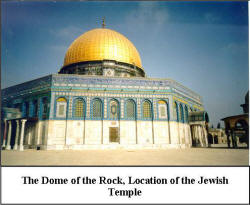 Islamic
Fundamentalism: Islamic
Fundamentalism:
Fundamentalism is a hard-line literal view of the world
through the eyes of the Quran. Islam is at war with
Jews and Christians for world domination in the cause of
Allah. As the earlier Muslims were at war with cities
refusing to accept Mohammed as the prophet,
Fundamentalist see themselves involved in a Jihad
or Holy War against the West.
Fundamentalist see the United States as Satan’s power in
the battle with Islam. Television, movies, alcohol,
carnal lifestyles and their influence on Muslim
countries pits the US and the West at war with Islam.
Furthermore, the United States support for Israel
enrages Muslims, Israel is seen as Enemy No.1 to Muslim
nations. For three main reasons;
1. There is great deal of hostility toward Jews
within the Koran and Hadith. They view Jews are seen as
the killers of prophets and enemies of God. Muslims who
are strict students of the Koran see themselves at war
with Jews.
Bukari ( Hadith)
Allah's Apostle
(peace be upon him) said: The Last Hour would not come
unless the Muslims will fight against the Jews and the
Muslims would kill them until the Jews would hide
themselves behind a stone or a tree and a stone or a
tree would say: Muslim, or the servant of Allah, there
is a Jew behind me; come and kill him; but the tree
Gharqad would not say, for it is the tree of the Jews.
SAHIH MUSLIM (Hadith)
O ye
who believe take not the Jews and the Christians for
your friends and protectors: they are but friends and
protectors to each other. And he amongst you that turns
to them (for friendship) is of them. Verily Allah
guideth not a people unjust. Surah 5:51
2. The nation of Israel occupies land formerly
held by Muslims and Fundamentalist see themselves as
solders in a battle to regain the land. Palestinian
suffering is a rallying cry to Muslim nations for Jihad.
3. Jerusalem and The Dome of the Rock: The
location of Solomon's Temple is the 3rd most Holy Place
to Muslims. And Jerusalem has been a Holy Muslim city
for the last 13 centuries. The Dome of the Rock was
built on the Temple site to demonstrate Islam as the
final religion in the world. Jewish talk of rebuilding
the Temple infuriates the Muslim world.
The situation with Israel, the West and Islam cause
Fundamentalist to apply the principle of Jihad to the
West. America is seen as idolatrous Mecca who stood in
the way of the Islam advance. Attacks on the West via
terrorism are seen as justified based on the attacks on
the enemies of Islam in the same way the early armies of
Islam waged war on its enemies.
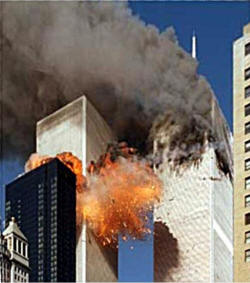 Jihad:
Jihad is battle in the cause of Allah in which the
fighter gains immediate entry to Paradise. The Muslim
has the right to slay anybody who has attacked Muslim
sovereignty. This was considered one of the Jihad:
Jihad is battle in the cause of Allah in which the
fighter gains immediate entry to Paradise. The Muslim
has the right to slay anybody who has attacked Muslim
sovereignty. This was considered one of the
Allah
hath purchased of the Believers their persons and their
goods; for their (in return) is the Garden (of
Paradise): they fight in His Cause, and slay and are
slain: a promise binding on Him in Truth, through the
Law, the Gospel, and the quran QurŸan: and who is more
faithful to his Covenant than Allah? Then rejoice in the
bargain which ye have concluded: that is the achievement
supreme.
Surah 9:111.
if
they withdraw not from you nor give you (guarantees) of
peace besides restraining their hands, seize them and
slay them wherever ye get them: in their case we have
provided you with a clear argument against them.
Surah 4:91
190
Fight in the cause of Allah those who fight you, but do
not transgress limits; for Allah loveth not
transgressors.
191 And slay them
wherever ye catch them, and turn them out from where
they have turned you out; for tumult and oppression are
worse than slaughter; but fight them not at the Sacred
Mosque, unless they (first) fight you there; but if they
fight you, slay them.
Such is the reward
of those who suppress faith
Surah 2:190-191
| 
 Pre-Islamic
Pre-Islamic At
the age of 25, Mohammed married a 40-year old wealthy
widow named Khadijah who owned trading caravans. During
the next 15 years of his life, Mohammed interacted with
Arabs known as the Hanefites. Hanefites were Arabs who
rejected idol worship and were searching for the true
religion. They looked to the religion of the Jews and
Christians as being closer to the goal of truth, their
mission was to search for truth. The Hanefites
abandoned their idols, retreated to the caves of Mecca
in meditation and prayer.
At
the age of 25, Mohammed married a 40-year old wealthy
widow named Khadijah who owned trading caravans. During
the next 15 years of his life, Mohammed interacted with
Arabs known as the Hanefites. Hanefites were Arabs who
rejected idol worship and were searching for the true
religion. They looked to the religion of the Jews and
Christians as being closer to the goal of truth, their
mission was to search for truth. The Hanefites
abandoned their idols, retreated to the caves of Mecca
in meditation and prayer.  After
the defeating the Byzantines and Persian kingdoms in
successive battles in Palestine and the Middle East, the
armies of Islam continued to advance. The armies of
Islam advanced into North Africa, taking control of the
southern Mediterranean regions. Within 100 years of
Mohammad’s death, the armies of Islam reached the city
of Tours, in France. In Tours the Muslim advance was
stopped.
After
the defeating the Byzantines and Persian kingdoms in
successive battles in Palestine and the Middle East, the
armies of Islam continued to advance. The armies of
Islam advanced into North Africa, taking control of the
southern Mediterranean regions. Within 100 years of
Mohammad’s death, the armies of Islam reached the city
of Tours, in France. In Tours the Muslim advance was
stopped.  The
Books of Islam
The
Books of Islam Islamic
Fundamentalism:
Islamic
Fundamentalism: Jihad:
Jihad: